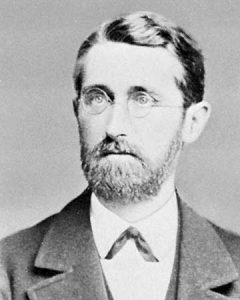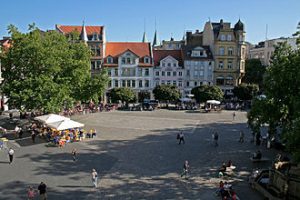 This year was the 100th anniversary of the death of Dedekind (6.10.1831 – 12.2.1916), a great mathematician who is less well known than he deserves. There have been lectures and celebrations on the subject in many places, including at the IMUS in Seville. On the day of his birth, a congress was held in his memory in Braunschweig or Brunswick (Germany), from which I am now returning. I would like to share some of this experience with you.
This year was the 100th anniversary of the death of Dedekind (6.10.1831 – 12.2.1916), a great mathematician who is less well known than he deserves. There have been lectures and celebrations on the subject in many places, including at the IMUS in Seville. On the day of his birth, a congress was held in his memory in Braunschweig or Brunswick (Germany), from which I am now returning. I would like to share some of this experience with you.
First of all, it was very interesting for me to learn more about the life and personality of Richard Dedekind: there was even a guided tour of Brunswick, led by… Richard himself and his sister Julie! (obviously, played by actors). It is always difficult to get a complete idea of the personality of these remarkable dead people that we historians study, although sometimes it is very important. I have had to correct my ideas on some points. It seems that Dedekind was quite fond of jokes, and even famous for the dirty jokes he liked to tell. He was also a very good pianist, famous in the city and much sought after to accompany singers: as a young man he devoted as much time to music as to study, and even when he was already teaching as a “Privatdozent” in Göttingen, he still played a lot. He certainly enjoyed a pleasant life because of his good contacts in Braunschweig society: he came from a well-to-do family – though not a noble or wealthy one – from what they call the “Bildungsbürgertum” or educated bourgeoisie, and he maintained contacts with writers, singers, scientists, musicians, politicians, engineers, etc. He became a well-known personality in his city, especially after acting as Rector giving birth to the new Polytechnic (1872-1875), the predecessor of today’s Technical University. He was also the renowned mathematician visited by many scientists, who went to Brunswick just to see him: Kronecker, Cantor, Frobenius, Minkowski, Hilbert… He always remained single, as was his sister (a successful writer and educator dedicated to social causes), but it seems that there was no shortage of love affairs, and even rumours of a son abroad.
I will soon tell you something interesting about politics, but I think it is a better idea to alternate purely historical with mathematical matters. Dedekind’s best known works are his writings on foundations (on the real numbers, natural numbers, and set theory), which are easily accessible in many languages, and which continue to be read and studied. But we must always remember that his main contribution was in the field of algebra and advanced number theory: as a plaque on the wall of his house in Brunswick (a beautiful house, very well located near the theatre) says, he was a pioneer and “founder of modern algebra”. The great Emmy Noether liked to repeat that ‘everything is already in Dedekind’. Moreover, he was a remarkable character for the great amount of exchange he had with other mathematicians: not only the famous correspondence with Cantor, but with many others, H. Weber, Frobenius, etc.
 Let’s go into politics. Dedekind’s family, well situated in a rich and independent city, were people of strong convictions: although they felt German, they were very much from Brunswick and did not like the Prussians and their militarism at all. (Germany, like other countries, is very diverse and we cannot think that all its territories are the same.) Between Brunswick and Berlin there was the same kind of rivalry that can often be found between neighbouring cities, with the aggravating circumstance that the two belonged to different states (the Duchy of Brunswick continued to exist until the end of World War I, and especially in the 19th century it was independent). Moreover, the expansionism of the Prussians did not exactly please them, quite the opposite. So Dedekind, like his brothers, was opposed to Chancellor Bismarck and distrusted the Empire, and this perhaps explains why he did not want to leave his home town when he was approached with offers from universities dominated by the Ministry in Berlin (and there were many offers: Hannover, Strasbourg, Giessen, Göttingen twice, and more). Dedekind was also a true pacifist, as he demonstrated during the Franco-Prussian war and also when World War I arrived: he refused to sign the (in)famous manifesto of the German scientists, and the French rewarded him by being the first to mourn his death.
Let’s go into politics. Dedekind’s family, well situated in a rich and independent city, were people of strong convictions: although they felt German, they were very much from Brunswick and did not like the Prussians and their militarism at all. (Germany, like other countries, is very diverse and we cannot think that all its territories are the same.) Between Brunswick and Berlin there was the same kind of rivalry that can often be found between neighbouring cities, with the aggravating circumstance that the two belonged to different states (the Duchy of Brunswick continued to exist until the end of World War I, and especially in the 19th century it was independent). Moreover, the expansionism of the Prussians did not exactly please them, quite the opposite. So Dedekind, like his brothers, was opposed to Chancellor Bismarck and distrusted the Empire, and this perhaps explains why he did not want to leave his home town when he was approached with offers from universities dominated by the Ministry in Berlin (and there were many offers: Hannover, Strasbourg, Giessen, Göttingen twice, and more). Dedekind was also a true pacifist, as he demonstrated during the Franco-Prussian war and also when World War I arrived: he refused to sign the (in)famous manifesto of the German scientists, and the French rewarded him by being the first to mourn his death.
For Dedekind, as many people know, numbers are “free creations of the human mind”. All his life he insisted on this idea of ‘creation’ — that we humans have a remarkable creative ability that is expressed in mathematics just as (if not more than) in other fields. In his beautiful paper ‘Continuity and irrational numbers’ he solves the problem of introducing real numbers with the famous cuts \(\langle A_1,A_2\rangle\) on the set of rational numbers \(\mathbb Q\). But he always maintained that it is better to consider the irrationals as “new individuals” that we create in the mind, so that every non-rational cut is matched by an irrational number. Prof. Müller-Stach drew attention to how Dedekind treated this case differently from the ideals in algebraic number theory: here he did not insist on introducing new numbers, but worked directly with ideals. (Ideals are infinite sets, rather simple structures that are defined on a ring of algebraic integers and that allow the properties of divisibility in the ring to be studied in a complete way.) In my opinion, the difference was more didactic than methodological: we do not proceed in the same way in the case of the reals, a very basic domain of numbers that is studied from high school and employed everywhere, as in the case of Dedekind’s “ideals”, which are objects of advanced mathematics. I could mention some texts to support this idea that there was not a fundamental difference for him, but only one of convenience.
The notion of numbers as “free creations” has always attracted the attention of philosophers, and has caused quite a bit of ink to flow arguing the pros and cons of such an approach. Some welcomed it, like Cantor and Hilbert, as they shared the idea that pure mathematics should be very free to study any structure (as long as it is consistent); others criticised it harshly, like Frege, who had a somewhat Bismarckian attitude towards rigour and objectivity. During the conference that led me to write this entry, Prof. E. Reck rightly pointed out that in Dedekind’s writings one often finds philosophical pearls, very engaging aphorisms that are like the tip of an iceberg, but which demand a careful task of clarification until one succeeds in unfolding their content and implications.
There is much more to be said. I was struck in a lecture by Prof. Ullrich by his quotation from a letter sent by famous analyst H. A. Schwarz to his teacher Weierstrass, where he comments that he would find it “most welcome” if Dedekind were to become a professor at Göttingen: “Prof. Dedekind is infinitely modest, kind, communicative, and I would be delighted to collaborate with him” (letter to Weierstrass from 1885). There were several talks, among them one by Leo Corry, commenting and qualifying in various ways the famous “it’s all in Dedekind already”. But I would like to close this writing with a quote, also from the great algebrist Emmy Noether, which I used in my lecture. What she said about herself (letter from E. Noether to Hasse, 12 Nov. 1931) can also be applied to her admired predecessor: “My methods are methods of work, methods of understanding, and so they have spread everywhere anonymously” (Meine Methoden sind Arbeits- und Auffassungsmethoden, und daher anonym überall eingedrungen). This anonymity, which is also linked to the modesty of Dedekind and Noether, explains why today we remember the importance of their contributions much less than they deserve.
Read the classics, read Dedekind; for example, as Prof. O. Deiser invited us, take the precious opportunity to read the correspondence between Cantor and Dedekind. As Deiser said, the Cantor-Dedekind correspondence has great pedagogical value — you learn a lot about mathematics, about how mathematics is done, and about the joys and problems of research, by reading that magnificent collection of letters.

Leave a Reply